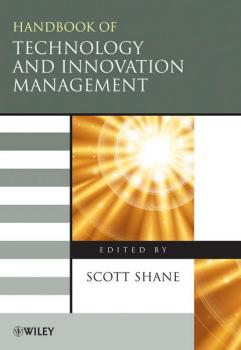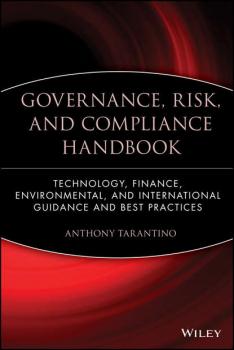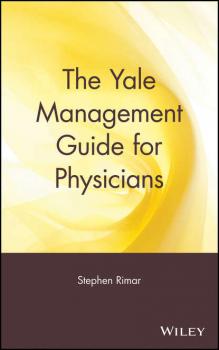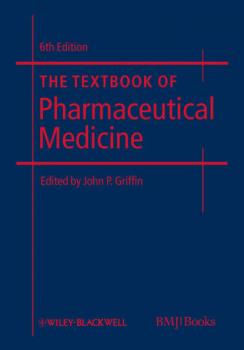Группа авторов
Список книг автора Группа авторовThe Handbook of Technology and Innovation Management
This timely handbook represents the latest thinking in the field of technology and innovation management, with an up-to-date overview of the key developments in the field. Under the separate but related headings of market environment; business models; innovation processes; and organizational design; leading scholars contribute essays that chart the important debates and emergent issues in the field of technology and innovation management.
Governance, Risk, and Compliance Handbook
Providing a comprehensive framework for a sustainable governance model, and how to leverage it in competing global markets, Governance, Risk, and Compliance Handbook presents a readable overview to the political, regulatory, technical, process, and people considerations in complying with an ever more demanding regulatory environment and achievement of good corporate governance. Offering an international overview, this book features contributions from sixty-four industry experts from fifteen countries.
Handbook of Information Security, Information Warfare, Social, Legal, and International Issues and Security Foundations
The Handbook of Information Security is a definitive 3-volume handbook that offers coverage of both established and cutting-edge theories and developments on information and computer security. The text contains 180 articles from over 200 leading experts, providing the benchmark resource for information security, network security, information privacy, and information warfare.
Handbook of Information Security, Key Concepts, Infrastructure, Standards, and Protocols
The Handbook of Information Security is a definitive 3-volume handbook that offers coverage of both established and cutting-edge theories and developments on information and computer security. The text contains 180 articles from over 200 leading experts, providing the benchmark resource for information security, network security, information privacy, and information warfare.
Business the Richard Branson Way
In many ways, Richard Branson and his company the Virgin Group are unique. In an era dominated by strategists, Branson is an opportunist with an uncanny knack of sniffing out great deals where others hesitate or fear to tread. Never before has a single brand been so successfully deployed across such a diverse range of goods and services. Branson is the ultimate brand builder. So how does he do it? Now bought completely up to date for this new edition, Business the Richard Branson Way, not only reveals the secrets of Branson's remarkable success but also draws out the universal lessons and identifies strategies that can be applied to any business or career. From picking on someone bigger than you to moving faster than a speeding bullet, and from making work fun to keeping the common touch, you have in your hands the secrets of phenomenal success. Contents Richard Branson Revisited The Life and Times of Richard Branson One Pick on Someone Bigger Than You Two Do the Hippy, Hippy Shake Three Haggle – Everything's Negotiable Four Make Work Fun Five Do Right By Your Brand Six Smile for the Cameras Seven Don't Lead Sheep, Herd Cats Eight Faster than a Speeding Bullet Nine Size Does Matter Ten Never Lose the Common Touch How to Build a Brand the Branson Way Last Word
The Yale Management Guide for Physicians
A real-world education for the twenty-first-century physician Being a good doctor is no longer enough. The twenty-first-century physician who wants to deliver quality medical care to patients and operate a successful practice must develop expertise in a variety of business and management skills. The Yale Management Guide for Physicians identifies these critical skills and provides both the theoretical understanding and the practical training physicians need to become competent, confident managers as well as accomplished healers. From healthcare policy and health economics to healthcare marketing and negotiating, this comprehensive guide addresses all of the major issues affecting the delivery of healthcare services in the twenty-first century. This remarkably effective manual helps doctors acquire the skills they need to expand their practices; develop, articulate, and advocate ideas; discuss and manage financial issues; manage the decision-making process; and assume a leadership role in the healthcare industry. Meticulously cross-referenced and organized, The Yale Management Guide for Physicians is destined to become the most important nonmedical volume in any physician's library, providing easy access to management principles and practical solutions to management problems faced by physicians every day.
Apples, Insights and Mad Inventors
Apples, Insights and Mad Inventors is a collection of timeless, thought-provoking observations on a range of marketing issues from one of the industry’s best-known names – Jeremy Bullmore. Most of the pieces originally appeared in the annual reports of WPP, while others were the basis for conference keynote addresses. With topics ranging from client management and brand management to strategy and product development, and sources of inspiration as diverse as Posh Spice and Benjamin Franklin, this entertaining and enlightening book is essential reading for any communications professional.
The Textbook of Pharmaceutical Medicine
The Textbook of Pharmaceutical Medicine is a standard reference for all those working in pharmaceutical medicine and the recognised text for the UK Faculty of Pharmaceutical Medicine Diploma. This is a comprehensive volume covering the processes by which medicines are developed, tested and approved. Regulations for drug development in the UK, EU, USA, Australia and Japan are discussed, providing relevant information for drug approval in the main continents where new drugs are developed. The chapters are written by leading academics, medical directors and lawyers, providing authoritative and in-depth information for trainees on the Faculty course, and for physicians working in the pharmaceutical industry. As well as thorough updating of the regulatory chapters, the 6th edition includes chapters on these vital new areas: Paediatric regulation Ethics Due diligence and the pharmaceutical physician
Neighbourhood Renewal and Housing Markets
The academic and policy interest in the development of cities, the renewal of residential and older industrial neighbourhoods in cities, and issues to do with race, polarisation and inequality in cities has remained at the forefront of policy and academic debate across Europe and North America. This book provides an important new contribution to these debates and highlights specific issues and developments which are crucial to an understanding of debates about residence, renewal and community empowerment. engages with the urban regeneration, development and housing aspects of real estate places debates on polarisation, inequality and race in a city-based structure provides up-to-date account of policy developments
Economics of the Mortgage Market
The analysis of the mortgage market is a specialised field but examines a financial market with extremely wide-ranging implications; it affects the stability of the whole economy. The key thing about this analysis is the increasing importance of the secondary mortgage market – which in the US is now several times larger than the market for government debt. The UK secondary mortgage market is also growing and the book will provide a timely resource to those active and interested in this important financial market. The 1990s saw an enormous growth of mortgage market analysis as an academic subject and there is a vast literature scattered among the key real estate journals. There is now a great need to not only bring this very complex subject area together, but also to abstract the main issues and to render them intelligible. The book will provide an organised research resource and also inform and motivate further research into the microeconomics of mortgage markets.









